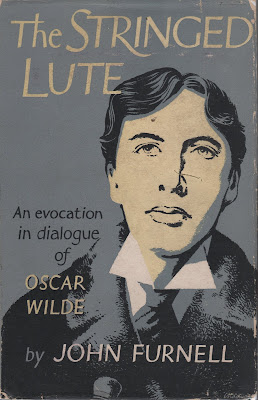 |
| New York : Boni & Liveright, 1928 |
In 1928, Cohen penned the first play on the life of Oscar Wilde in English. He refers to it as having been 'written for presentation — rather than for reading', however it was inadvisable to produce it in climate of New York at the time. In the play's forward, he also makes it very clear that he intends to leave history to the historians. A significant amount of artistic license has been taken with the facts of history.
The story is focused on four major events: Marquess of Queensberry's confrontation of Wilde regarding his relationship with Queensberry's son,
Lord Alfred 'Bosie' Douglas, a truncated telling of the trials — primarily focused on Wilde's libel suit against Queensberry and then a single trial for gross indecency, a short scene in prison, and finally Oscar in Paris following his two years at Reading Gaol.
Since the play doesn't intend to strictly follow actual events, major characters in the real-life drama have been replaced and/or renamed. Completely absent are Lady Wilde (Wilde's mother) and Constance (Wilde's wife). The character of Lady Diana, a jilted lover of sorts, serves the dual role of would-be savior and as the representation of society's opinion of Wilde and his behavior. The most comical addition to the cast of characters is Zadi, a servant girl who is brought in to replace Melville, a page, after rumors of Wilde's sexual behaviors are known. She is dressed in a gauzy harem costume which leaves nothing to the imagination and her presence is intended to throw the public off the track. The running joke is that the men who visit Oscar pay her little attention. Lord Alfred is written as a petulant and self absorbed young man determined to hurt his father regardless of how that may affect others. Oscar, on the other hand, is depicted as completely in Lord Alfred's control and unable to defy his wishes.
Cohen uses Wilde's style to great effect, creating conversations among the characters that are both witty and biting. For instance, when Lady Diana says 'Oh - I suppose I'm an idiot.', Wilde replies, 'You just go on making one discovery after another, don't you Diane?' What starts out as a comedy quickly turns dark during the trial scene. The 'sin' of excess must of course be punished. Repentance during incarceration soon follows.
 |
Left: Oscar Wilde by David Peña
Buenos Aires : Sociedad Editorial Argentina, 1922
Right: Oskar Wilde : Sein Drama by Carl Sternheim
Potsdam : G. Kiepenheuer, 1925 |
Although Wilde did convert to Catholicism while in prison, Cohen might take that transformation a bit too far. In particular, he suggests that Lord Alfred breaks with Oscar after he so spectacularly loses the libel suit against Queensberry. As well, after serving his prison term, Oscar thinks of their relationship as an anomaly when he 'lost [his] way in life - and stumbled into the slime'. We know from history that he did see Lord Alfred again after prison and he certainly had other liaisons before, after and during his relationship with him.
Oscar Wilde's ordeal became the subject of many plays starting in the early 1920s. Prior to Cohen's 1928 work, two non-English plays about Oscar Wilde were published: David Peña's Spanish play,
Oscar Wilde, in 1922 and Carl Sternheim's German play,
Oskar Wilde: Sein Drama in 1925. The French, with their more liberal attitudes regarding sexuality, helped to keep Oscar Wilde's story and his writings alive even as the British had consigned him to oblivion. As M. de Vedia y Mitra notes in the forward to Peña's work, the educated classes of Argentina had adopted the French language and their connection to Wilde's work was largely through French translations. During the period of the Wiemar Republic, Germany also maintained more liberal views on sexuality and staged productions of Wilde's work during that time. Sternheim's play elevated Wilde beyond simply the author of these plays, to a subject of theatrical production itself.
Bibliographies & Ratings: Cory (IV); Garde (OTP, C *); Mattachine Review (IV); Young (716)



![Left: Oscar Wilde : Tre Atti by Niccolò De' Colli Firenze : Gruppo di cultura fiorentino degl'ISVICI, 1933 Right: Le procès d'Oscar Wilde : Pièce Inédite, en Trois Actes Précédés d'un Prélude by Maurice Rostand Paris : [publisher not identified], 1935 Left: Oscar Wilde : Tre Atti by Niccolò De' Colli Firenze : Gruppo di cultura fiorentino degl'ISVICI, 1933 Right: Le procès d'Oscar Wilde : Pièce Inédite, en Trois Actes Précédés d'un Prélude by Maurice Rostand Paris : [publisher not identified], 1935](https://blogger.googleusercontent.com/img/b/R29vZ2xl/AVvXsEgz5SZ5FHS4zobiRc6Y74P5SsTjZjWRyAbnNRUjFS9Jf1vuLmhZ0si7CpF0hvurSyAHAdu9xCbt1jd-ZFZIOmv_NWG6ETF6xepsLklFopBMweEgIEr2QZv5bUMv2n5CrUd_gPD-KmY_kgY/s320/Colli_Rostand_OscarWilde.jpeg)




